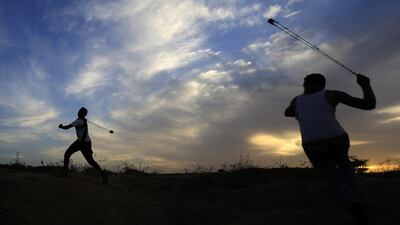Look closely at the footage of Palestinians protesting against Israeli occupation and you will soon notice how young they are. Shouting out slogans focusing on liberty and justice, they are representative of a disillusioned community that has known nothing but suffering.
The most organised wrap kaffiyehs around their heads and use slingshots. Many others, including schoolboys, throw stones with their bare hands. Whether male or female, all are incensed by decades of brutal occupation, an oppressive apartheid regime, and the constant threat of death or maiming by one of the most powerful military machines in the world. Their dissent is met with live fire, rubber-coated steel bullets, tear gas and truncheon charges.
Stand-offs with Israeli soldiers take place across the Occupied Palestinian Territories, including the Gaza Strip, which has been under siege for almost a decade. It is extremely difficult for anybody living there to get hold of basic necessities including food, water, energy and medical supplies. Israel controls everything – land, air and sea borders – in a narrow area described by western politicians as an open air “prison camp”.
Around 44 per cent of Gaza’s population of 1.8m is under 14 years of age, and the median age is 18. Such statistics stick in your head when you consider how many boys, girls and babies are routinely slaughtered by Israeli offensives. Nearly 600 were obliterated last summer alone during the assault on Gaza. This asymmetrical conflict has everything to do with Israel’s multibillion dollar arsenal and its callous determination to portray attack as “defence”.
Illegal land grabs, extrajudicial executions and the illicit imprisonment and torture of thousands of Palestinians are barely mentioned. Other profound grievances are caused by the constant unlawful demolition of homes and daily humiliations at checkpoints. Latterly, the Israeli incursions at Al Aqsa Mosque have been hugely provocative.
More generally, Israelis flatly oppose the UN resolution passed in 1948 that recognises the right of return of millions of Palestinians forcibly displaced from their homes.
Unspeakably barbaric incidents in recent weeks saw baby Ali Dawabsheh and members of his family burnt to death by Israeli settlers in the West Bank. The killing of two-year-old Rahaf Hassan and her pregnant mother, Noor, in an Israeli missile attack in Gaza also sparked immense rage.
United Nations admonishments, international law and war crimes allegations are arrogantly ignored. Instead, the message from Israel and its propagandists – whether politicians, diplomats or compliant media commentators – is that the Palestinian people are the criminals and aggressors.
All violence is to be deplored, but to associate every demonstrator with those who are driven to use potentially lethal weapons is to profoundly distort what is actually happening. Lone wolf attackers with kitchen knives, meat cleavers, Molotov cocktails and firearms, or who ram cars into civilians, are portrayed as the norm: the idea is that all Palestinians are bloodthirsty “terrorists” who should be gunned down.
Meanwhile trigger-happy troops support knife and gun-wielding Jewish settlers and other armed Israeli extremists – and indeed stone and Molotov cocktails-throwing ones too – as they take part in punitive missions against Palestinians. Israeli police disguise themselves as Palestinian stone-throwers to infiltrate protests, before shooting demonstrators at close range.
The racism and hatred entrenched in segments of Israeli society is summed up by the standard rallying cry of “Death to Arabs” used by lynch mobs, and also by the inflammatory language of politicians such as Benjamin Netanyahu, who now accuses Palestinians of being responsible for the Nazi Holocaust.
In fact stone throwing or worse is by no means the only form of resistance. Palestinians share a proud tradition of non-violence against systematic oppression. The increasingly successful Boycott, Divestment and Sanctions movement, which is based on a call by Palestinians for international economic and political pressure on Israel, is a classic example of how effective it can be.
There is not a single historical precedent for a colonised people accepting their fate. The difference nowadays is that Israeli violence is easily recorded – crimes that were cunningly covered up just a few years ago are now exposed by instantly publishable videos. The resistance that follows is available for all to see. It may be ugly at times, but it is as inevitable as it ever was. Throwing stones is without doubt a symptom of what is going on, and by no means the cause. Unless Israel starts to deal with that fact, then its future will become more uncertain by the day.
Nabila Ramdani is a French-Algerian journalist and broadcaster who specialises in Islamic affairs and the Arab world
On Twitter: @NabilaRamdani

